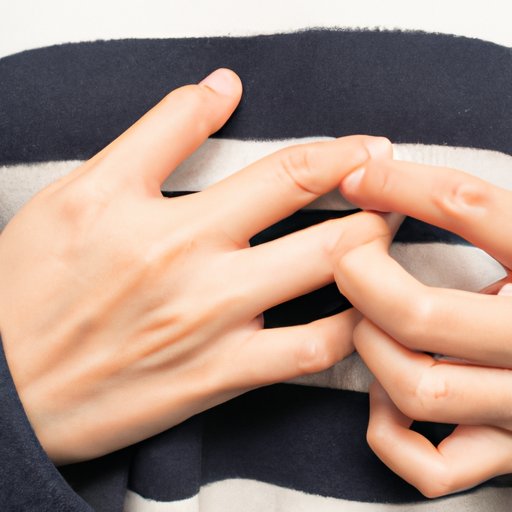Introduction
There’s nothing more frustrating than climbing into bed for a good night’s sleep, only to find yourself scratching and itching all night long. Nighttime itchy skin is a common problem that affects many people, and it can be caused by a variety of factors. In this article, we’ll take a look at the most common causes of nighttime skin irritation, natural remedies to manage the itchiness, the connection between insomnia and itchy skin, and how you can talk to a dermatologist about finding relief.
Causes of Nighttime Itchy Skin
There are many reasons why your skin might start to itch at night, and it’s helpful to understand the most common causes so that you can find the appropriate treatment. Some of the most common causes of nighttime skin irritation include:
- Dry skin: If you have dry skin, it can become itchy and irritated, especially at night when the air is drier. Symptoms can include flaking, cracking, and redness.
- Allergies: If you are allergic to something in your environment, such as dust mites, animal dander, or pollen, it can cause nighttime itching and discomfort. Symptoms can include sneezing, watery eyes, and a stuffy nose.
- Bed bugs: If you have bed bugs in your mattress or bedding, they can bite you and cause intense itching. Symptoms can include small red bumps or welts on the skin.
- Medications: Some medications, such as antibiotics, can cause side effects that include nighttime skin itching. It’s important to talk to your doctor if you suspect your medication is causing your symptoms.
- Medical conditions: Some medical conditions, such as eczema or psoriasis, can cause nighttime itching and discomfort. Symptoms can include redness, inflammation, and flaking skin.
If you’re experiencing nighttime itchy skin, it’s important to identify the cause so that you can find the appropriate treatment. Some practical tips and treatments to alleviate the itching associated with each cause include moisturizing frequently, using allergy-proof bedding covers, and taking antihistamines in case of allergies.
The Connection Between Insomnia and Itchy Skin
Research has shown that there is a strong connection between poor sleep quality and nighttime skin irritation. When you don’t get enough sleep, it can worsen existing skin conditions and cause new ones to emerge, including acne, wrinkles, and an itchy sensation throughout the body.
There are several ways you can take steps to improve your sleep hygiene and minimize the impact of insomnia on your skin health. Some common tips include keeping your bedroom cool and dark, following a consistent sleep schedule, and limiting screen time before bedtime.
Managing Itchy Skin Naturally
For those who prefer natural remedies to traditional medication, there are several natural remedies and treatments for nighttime skin itchiness. One of the most effective ways to manage itchy skin is to use essential oils. Tea tree oil, lavender, and peppermint oil have soothing properties that can relieve itchiness and promote relaxation.
Other natural solutions to address discomfort include using gentle laundry detergents, taking oatmeal baths, and applying aloe vera. These natural remedies can treat the symptoms of itching and irritation without chemical additives, reducing the risk of allergies or other side effects.
The Role of Diet in Nighttime Skin Itchiness
Many people don’t realize that the foods they eat can have a direct impact on their skin’s health. Specific foods sensitivities or inflammation from an unhealthy diet can lead to nighttime skin irritation. Some of the dietary triggers of nighttime skin itching include alcohol, spicy foods, caffeine, and sugar. Avoiding these foods in your diet, or reducing the amount of them, can help alleviate the itchy skin symptoms.
Talking to a Dermatologist About Itchy Skin
If you’ve tried home remedies and lifestyle changes for your nighttime skin itching but still can’t find relief, it’s crucial to seek professional assistance from a dermatologist. A dermatologist can assess your skin’s health and suggest customized treatments or medications to alleviate the symptoms.
When looking for a qualified dermatologist, it’s essential to research and find one that has an excellent track record of treating skin conditions. The dermatologist should be able to accurately diagnose your skin condition and create a customized treatment plan that works for you.
Conclusion
Nighttime itchy skin is a common problem that affects many people and can have a significant impact on sleep quality. However, by understanding the common causes behind itching, patients can take proactive steps to prevent the discomfort. Through identifying the causes of discomfort and exploring natural remedies, altering the diet, and seeking professional assistance from a dermatologist, individuals can take control of their skin health and enjoy a restful, itch-free night’s sleep.
By following the guidelines and recommendations in this article, readers can enjoy a comfortable, delightful night’s sleep free. So don’t let the nighttime itching skin disturb your healthy sleeping pattern anymore. Follow these suggestions and tips and enjoy a relaxing sleep.
